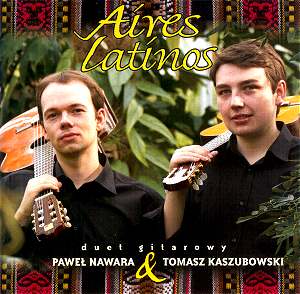Aíre Latíno
(without the plural) is also the name
of a recent recording of solo guitar
works, performed by David Russell.
I was a bit worried when I saw the
present disc. Russell is one of the
finest living guitarists, so he has
perhaps "earned the right"
to put out a collection of Latin American
bon-bons. But an unknown Polish duo?
I was afraid they were taking the
road of so many other debut guitar
albums, trotting out the same waltzes
and choros that got them through numerous
competitions and concert encores.
No worries. While
we do have a few pieces here by heavyweights
such as Lauro and Piazzolla, we also
have a preponderance of unknown repertoire,
much of it Argentinean but a few other
countries are also represented. And
the Polish guys play the Latin American
music superbly. The uniquely cross-cultural
nature of this enterprise is evidenced
in a small way by the unique combination
of languages in which the liner notes
are printed: Polish, English, and
Spanish. The English translation is
not perfect, but not imperfect enough
to detract from comprehension.
A few notes on the
composers represented here. First,
the familiar names. Venezuelan Antonio
Lauro, and particularly his waltzes,
are staples of the solo guitar repertoire.
From the sounds of these arrangements,
there is plenty to keep two guitarists
busy. Ariel Ramírez is known
as a choral composer, and the piece
here, Pilgrimage, is an arrangement
of one of the songs from his Navidad
Nuestra (Our Christmas).
Astor Piazzolla is, of course, the
renowned figure who brought the tango
to the world of classical music.
The less familiar:
Eduardo Falú is an Argentinean
composer and singer who finds his
inspiration here in the zamba,
which (not the tango, it turns out)
is the national dance, a courtship
dance in which couples circle each
other waving white handkerchiefs.
Domingo Prat was a Spanish émigré
to Argentina after having studied
with Tárrega back home. Pignoni
composed his three-dance sequence
for the piano. He is also Argentinean;
beyond that there doesn’t seem to
be much information available in English,
which is unfortunate, because his
music is ingratiating. The milonga
is a Uruguayan type of song adapted
by Argentineans, in this case Gerónimo
Bianqui Piñero. He’s also a
difficult person to find information
about - one begins to wish that the
liner notes provided a little more
insight on the composers, though they
do a good job of introducing the pieces.
Atahualpa Yupanqui was a folklore
researcher who turned his research
into material for writing art-song;
La Pobrecita is a guitar arrangement
by Bianqui Piñero of one of
Yupanqui’s songs.
Brazilian composer
Jõao Teixeira Guimaraes, nicknamed
Pernambuco - which is both a region
in Brazil and a type of wood used
for violin bows - was active in musical
life in Recife and São Paulo
early in the twentieth century. Sounds
of Bells is written in the style
of the choro, which Villa-Lobos
would make famous. Jorge Cardoso is
a prolific Argentinean composer for
guitar, who has a web page at http://monsite.wanadoo.fr/jorgecardoso/
(some of which is in English).
Each piece, influenced
by both the rhythm of dance and the
lyricism of song, is worth repeated
listening. The "Duet Gitarowy"
or "guitar duo" of Pawel
Nawara and Tomasz Kaszubowski approach
perfection in this recording. Their
expression of color, dynamic contrast,
and rhythmic movement is spot-on.
They are assisted by a recording that
captures them clearly and warmly.
Bravos all around — I look forward
to hearing more guitar recordings
from Poland!
Brian Burtt


